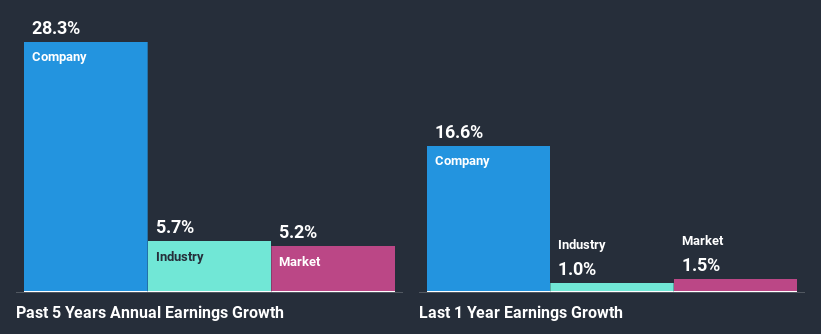- South Korea
- /
- Telecom Services and Carriers
- /
- KOSDAQ:A093320
Declining Stock and Solid Fundamentals: Is The Market Wrong About KINX, Inc. (KOSDAQ:093320)?
It is hard to get excited after looking at KINX's (KOSDAQ:093320) recent performance, when its stock has declined 14% over the past month. However, stock prices are usually driven by a company’s financial performance over the long term, which in this case looks quite promising. Specifically, we decided to study KINX's ROE in this article.
Return on equity or ROE is an important factor to be considered by a shareholder because it tells them how effectively their capital is being reinvested. Put another way, it reveals the company's success at turning shareholder investments into profits.
Check out our latest analysis for KINX
How Do You Calculate Return On Equity?
The formula for ROE is:
Return on Equity = Net Profit (from continuing operations) ÷ Shareholders' Equity
So, based on the above formula, the ROE for KINX is:
15% = ₩17b ÷ ₩110b (Based on the trailing twelve months to September 2020).
The 'return' refers to a company's earnings over the last year. That means that for every ₩1 worth of shareholders' equity, the company generated ₩0.15 in profit.
What Is The Relationship Between ROE And Earnings Growth?
So far, we've learned that ROE is a measure of a company's profitability. We now need to evaluate how much profit the company reinvests or "retains" for future growth which then gives us an idea about the growth potential of the company. Assuming everything else remains unchanged, the higher the ROE and profit retention, the higher the growth rate of a company compared to companies that don't necessarily bear these characteristics.
KINX's Earnings Growth And 15% ROE
To begin with, KINX seems to have a respectable ROE. Especially when compared to the industry average of 9.9% the company's ROE looks pretty impressive. Probably as a result of this, KINX was able to see an impressive net income growth of 28% over the last five years. We reckon that there could also be other factors at play here. For instance, the company has a low payout ratio or is being managed efficiently.
As a next step, we compared KINX's net income growth with the industry, and pleasingly, we found that the growth seen by the company is higher than the average industry growth of 5.9%.

Earnings growth is an important metric to consider when valuing a stock. What investors need to determine next is if the expected earnings growth, or the lack of it, is already built into the share price. This then helps them determine if the stock is placed for a bright or bleak future. If you're wondering about KINX's's valuation, check out this gauge of its price-to-earnings ratio, as compared to its industry.
Is KINX Using Its Retained Earnings Effectively?
KINX's three-year median payout ratio to shareholders is 14%, which is quite low. This implies that the company is retaining 86% of its profits. This suggests that the management is reinvesting most of the profits to grow the business as evidenced by the growth seen by the company.
Along with seeing a growth in earnings, KINX only recently started paying dividends. Its quite possible that the company was looking to impress its shareholders. Upon studying the latest analysts' consensus data, we found that the company is expected to keep paying out approximately 12% of its profits over the next three years. As a result, KINX's ROE is not expected to change by much either, which we inferred from the analyst estimate of 17% for future ROE.
Summary
In total, we are pretty happy with KINX's performance. Specifically, we like that the company is reinvesting a huge chunk of its profits at a high rate of return. This of course has caused the company to see substantial growth in its earnings. Having said that, the company's earnings growth is expected to slow down, as forecasted in the current analyst estimates. To know more about the company's future earnings growth forecasts take a look at this free report on analyst forecasts for the company to find out more.
If you decide to trade KINX, use the lowest-cost* platform that is rated #1 Overall by Barron’s, Interactive Brokers. Trade stocks, options, futures, forex, bonds and funds on 135 markets, all from a single integrated account. Promoted
Valuation is complex, but we're here to simplify it.
Discover if KINX might be undervalued or overvalued with our detailed analysis, featuring fair value estimates, potential risks, dividends, insider trades, and its financial condition.
Access Free AnalysisThis article by Simply Wall St is general in nature. It does not constitute a recommendation to buy or sell any stock, and does not take account of your objectives, or your financial situation. We aim to bring you long-term focused analysis driven by fundamental data. Note that our analysis may not factor in the latest price-sensitive company announcements or qualitative material. Simply Wall St has no position in any stocks mentioned.
*Interactive Brokers Rated Lowest Cost Broker by StockBrokers.com Annual Online Review 2020
Have feedback on this article? Concerned about the content? Get in touch with us directly. Alternatively, email editorial-team@simplywallst.com.
About KOSDAQ:A093320
KINX
Engages in the provision of Internet exchange (IX) services to various carriers, content providers, multiple system operators, financial institutions, and government agencies in South Korea and internationally.
Excellent balance sheet with reasonable growth potential.
Market Insights
Community Narratives



